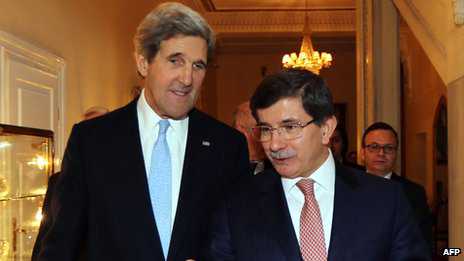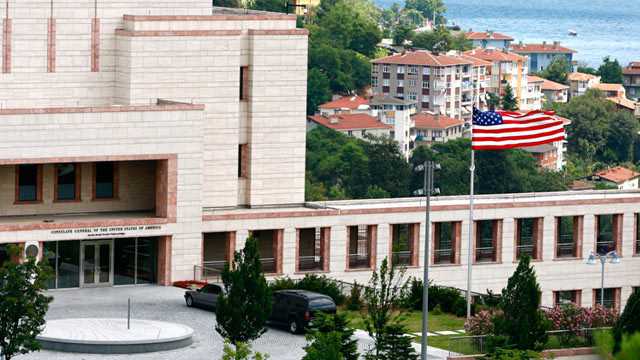by Suzan Boulad (Syria)
Dear Mr. Secretary of State John Kerry and Mr. Prime Minister Recip Tayyib Erdogan,
It is perhaps not with the utmost respect but with some respect when I sincerely ask of you both to just shut up.
Lately Mr. Kerry, you’ve managed to baptize your new term as Secretary of State with a a few headlines about how you gave Mr. Erdogan a stern talking to. You see, Mr. Erdogan committed a faux pas when he declared that Zionism was a crime against humanity, words which personally resonate with my support of the Palestinian people. (We’ve heard lots of great words from Turkey before, though, without nearly as many actions) But as Israel’s unilateral ally, the United States could not let these scary words go unanswered, and thus Mr. Kerry scolded Turkey, and by the way, the cameras caught your good side.
Mr. Erdogan, I’m sure you’ve been enjoying some cameras yourself. Such a strong, noble leader, taking a stand against the Middle East’s biggest bully in support of Palestinian rights. It’s funny that you should mention Palestinian rights.
Lately a protest was suppressed in Palestine violently using water cannons and tear gas, and many people were arrested. Palestinian politicians were also attacked by racist Israelis hurling stones and epithets at these distinguished figures. Palestinians are wasting away in Israeli prisons, charged unjustly and with little hope of release.
Oh wait.
That’s in Turkey. And those are Kurds, not Palestinians.
Of course, Palestinians are also suffering from all of these things, and this is not to compare two long and hard struggles for justice for two peoples. This isn’t to pit Palestinian vs. Kurd, but to reveal you, Mr. Erdogan, for the hypocrite you are. Because these injustices that you condemn when they happen to a Palestinian, also happen on a regular basis right under your nose and with your blessing to the Kurds. So, it’s great that you think you’re this wonderful protector of human rights, but I recommend looking a little closer to home. I know of a few cases of human rights abuses that should appeal to your philanthropic side.
As for you, Mr. Kerry, well. In your rush to take a strong stance against Turkey you seem to have forgotten that it is your government’s policy to support Turkey when it comes to certain interests, such as “fighting terrorism” and “surveillance”. In fact, it was your government’s assistance that helped Turkey “fight terrorism” when they slaughtered 34 innocent civilians in December of 2011 in the Roboski Massacre, using U.S. sponsored surveillance drones.
And so, Mr. Kerry, forgive me if I don’t take your umbrage at Turkey’s comments too seriously. You and I both know that Turkey is a valuable ally to the U.S., even if it accidentally says something too strongly in the way of human rights and justice.
So lets summarize these events, shall we? Mr. Erdogan calls Zionism a crime against humanity, then acts completely oblivious towards his own crimes. Israel gets its feathers ruffled and the U.S. via Mr. Kerry rushes to defend it bravely, while continuing to supply Turkey with weapons. Meetings are held, diplomats are soothed, and a lot of talking happens.
And in the meantime, Palestinians and Kurds continue to suffer.
Thank you for your time, Mr. Kerry and Erdogan,
Sincerely,
Suzan.
via Dear Mr. Kerry and Mr. Erdogan: Shut Up | Alliance for Kurdish Rights.






